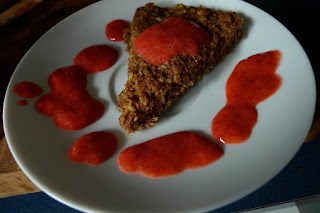Sprouting grains and low-temperature 'baking' them into bread is an ancient practice that yields very satisfying results! You end up with a delicious, chewy result that is truly satiating. Once you've tasted the sweetness of real, heirloom whole grain, you stop desiring the skeletonized version (i.e. Wonder Bread!). Enjoy this recipe!
The base of this scone is sprouted Kamut. Sprouting the kamut turns its sugars into a more assimilable form, similar to the type in fruits. According to Tonya Zavasta
Date and Walnut Scones : A Recipe by Cherie Soria
(Note: I substituted almonds for the walnuts: Feel free to use either nut.)
(dehydrator needed)
Yield: 8 scones (8 servings)
These sweet, dense breads are reminiscent of English scones.
Nutrition Note: With 10 grams of fiber, 7 grams of protein, and a nice complement of vitamins, minerals, and
essential fatty acids, these scones are no ordinary sweet treat.
1 1/2 cups (370 mL) kamut or winter wheat berries, sprouted for 36 hours, rinsed, and drained
3/4 cup (185 mL) chopped pitted dates, packed
3/4 cup (185 mL) walnuts, soaked and dehydrated (I substituted almonds)
1 teaspoon (5 mL) ground cinnamon
Pinch of ground nutmeg
Pinch of salt
1. Process the kamut in a food processor fitted with the S blade until the grains are broken into 3 or more
pieces each. The mixture should be sticky but not mushy.
2. Loosely separate the dates and add them to the food processor along with remaining ingredients. Process
just until the dates and walnuts are mixed in and broken into pieces. The dough should not be smooth; the
date and walnut pieces should still be visible.
3. Transfer the dough to a dehydrator tray lined with a nonstick sheet and press it firmly into a round shape,
about 1 inch (2.5 cm) thick.
4. Cut the round into 8 equal wedges. Separate them on the nonstick sheet, and dehydrate at 125 degrees
F/50 degrees C for 2 hours.
5. Lower the temperature to 105 degrees F/40 degrees C and continue dehydrating for another 3 hours.
6. Turn the scones over onto a mesh-lined dehydrator tray (without the nonstick sheet), and dehydrate for
2–3 hours longer, or until dry and crusty on the outside and tender and moist on the inside. Serve warm or cold.
7. Stored in an airtight container, Date and Nut Scones will keep for up to 1 week in the refrigerator or up to
2 months in the freezer.
Note: If you like, the bread may be warmed in the dehydrator at 125 degrees F (50 degrees C) for an hour before serving.
Bridget's Silly Strawberry Jam:
1/2 c. Strawberries (actually, any berries will work)
2-3 tsp. raw honey or 2-3 dates (preferably Bahri, which are a lower glycemic variety)
1 tsp. lemon juice
Below is a picture of this jam, made with blueberries, and spread onto a toasted, organic brown rice English muffin from Food for Life.



No comments:
Post a Comment
Note: Only a member of this blog may post a comment.